 Previous Page Next Page
Previous Page Next Page
The wizard varies with the data resource type used to create the banded object: query resource or business view.
This wizard appears when you click Insert > Banded Object in a page report that is created using query resources. It helps you to insert a banded object into the page report, and consists of the following screens:
Back
Goes back to the previous screen.
Next
Goes to the next screen.
Finish
Finishes creating the banded object and closes this dialog.
Cancel
Does not retain changes and closes this dialog.
Help
Displays the help document about this feature.
Specifies the dataset that you want to use to create the banded report.
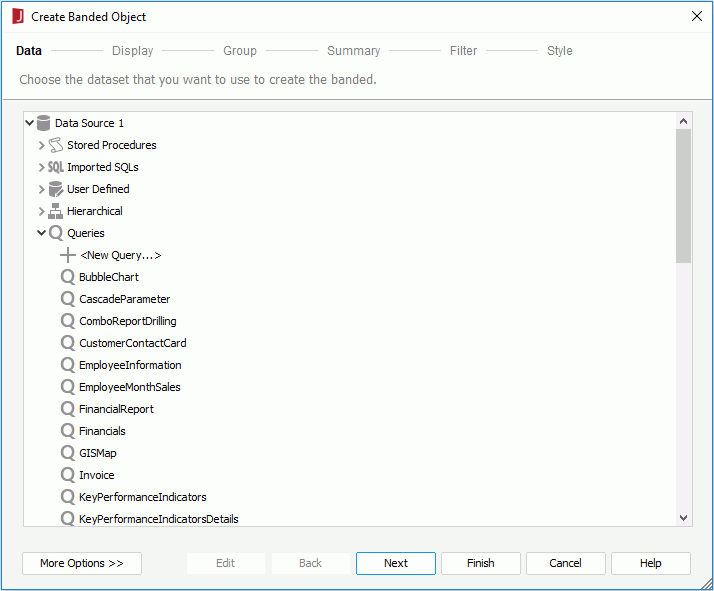
Resource box
Lists the available data resources in the current catalog. Select one to create the banded object.
More Options/Less Options
Shows or hides the dataset selection panel to choose a dataset for the banded object.
Specifies the data fields that you want to display in the banded object.
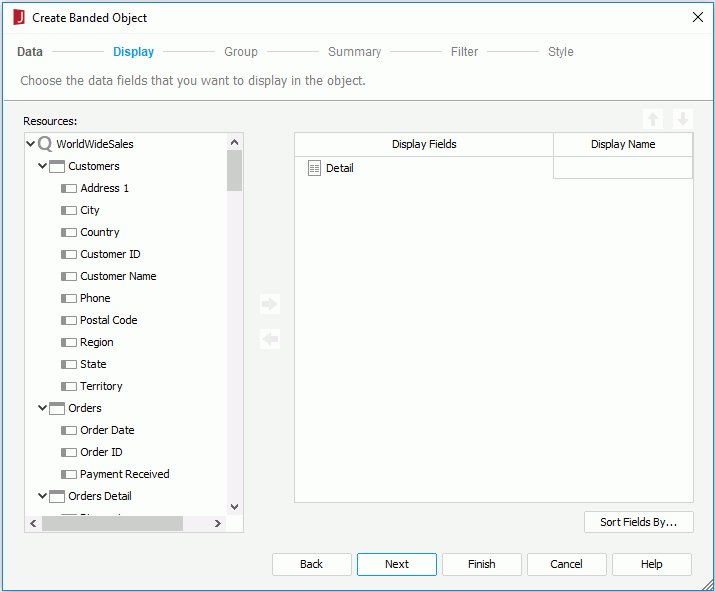
Resources
Lists all the available data resources.

Adds the specified field to use in the banded object.

Removes the specified field that is not required in the banded object.

Moves the specified field one step up.

Moves the specified field one step down.
Display Fields
Lists the fields that have been selected to display in the banded object.
Display Name
Shows the display names of the selected fields. You can click the name cells to edit them if required.
Sort Fields By
Opens the Sort Fields By dialog to specify how to sort data in the banded object.
Specifies the data fields that are used to group the data.
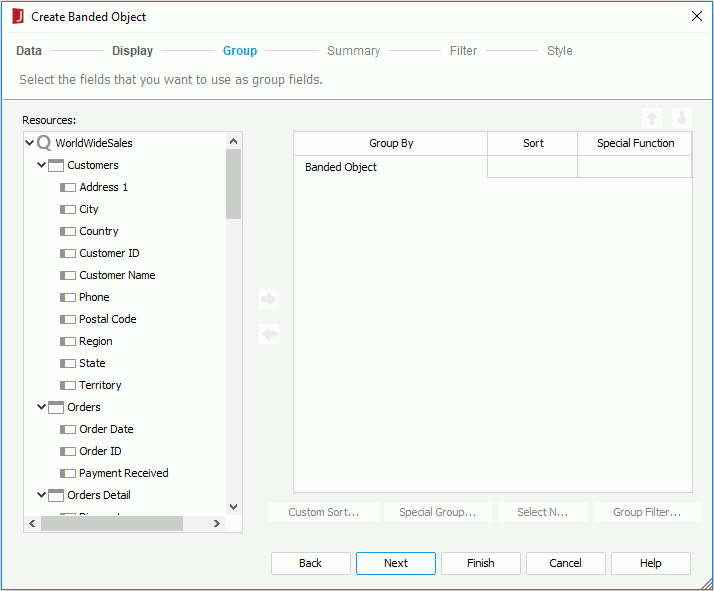
Resources
Lists all the available data resources.

Adds the selected field as the group-by field in the banded object.

Removes the selected group-by field that is not required.

Moves the specified group one step up.

Moves the specified group one step down.
Group By
Lists the fields that are used to group data in the banded object.
Sort
Specifies how groups at the specific group level will be sorted.
For example, if you placed a field named Region for grouping, and this field contains all 50 states of the United States; and if you want to see the data between Maryland (MD) and New York (NY), you can define the criteria by selecting the between operator to further define your grouping information.
Special Function
If the group-by field is of Numeric/String/Date/Time type, you can select a special function for the field in the Special Function column to further specify to which level the data will be grouped by.
If Customize is selected, the Customized Function dialog will be displayed, in which you can set the function by your own.
Custom Sort
Specifies how to sort the groups. Activated only when you have selected Custom Sort from the Sort column to define the sorting manner of groups for the selected group level.
Special Group
Specifies how to group your information. Activated only when you have clicked Special Group from the Sort column to define a special group.
Select N
Opens the Select N dialog to specify the Select N condition.
Group Filter
Opens the Group Filter dialog to specify the group filter condition.
Specifies the fields on which you want to create aggregate functions.
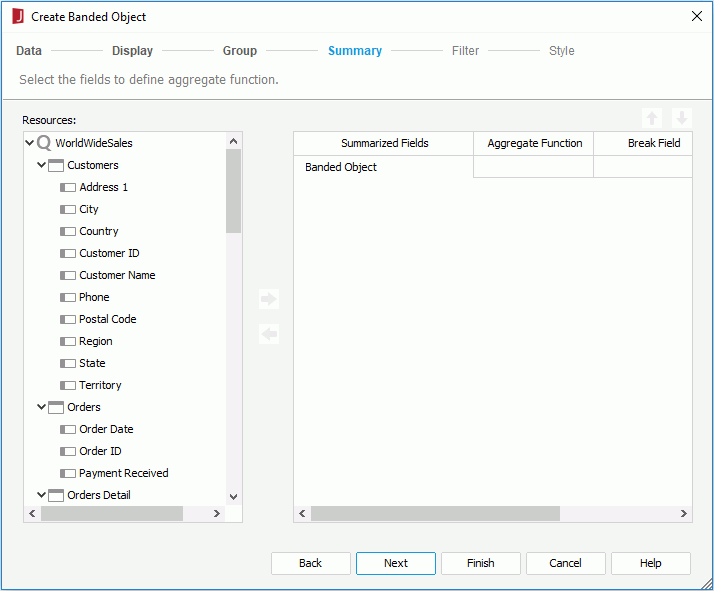
Resources
Lists all the available data resources.

Adds the selected field as the summary field to the banded object.

Removes the selected summary field that is not required.

Moves the specified summary field one step up.

Moves the specified summary field one step down.
Summarized Fields
Lists all the fields that you want to display and to be summarized in the banded object. If an aggregation is added under the Banded Object node, it will be displayed in the banded panel. If an aggregation is added under the node of a specified group, it will be displayed in the corresponding group panel.
Aggregate Function
Specifies the function to summarize the selected field.
Break Field
Displays a defined field on which the summary will be calculated. If a summary field is added below the Banded Object node, the break field is null and the summary will be calculated on the whole dataset.
Position
Works together with the Column option to specify the location where the summary field will be put.
Column
Works together with the Position option to specify the location where the summary field will be put.
Specifies to filter data displayed in the banded object.
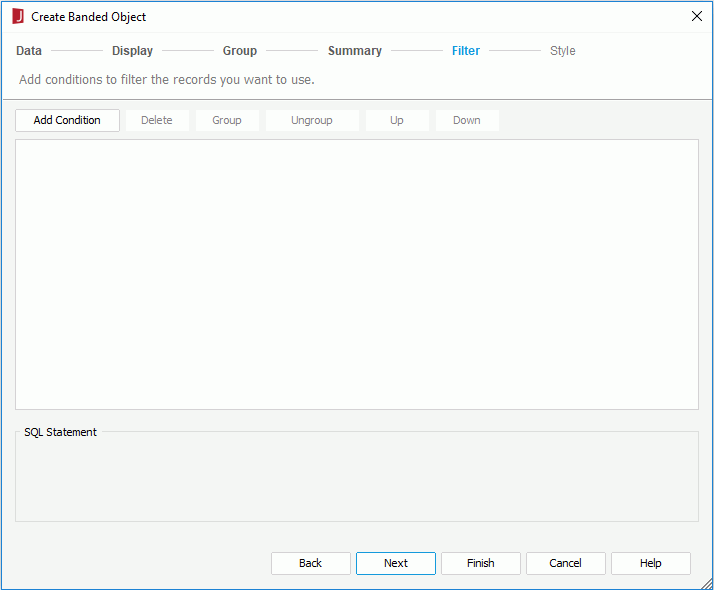
The options in the screen are the same as those in the Edit Filter dialog.
Specifies the style of the banded object.
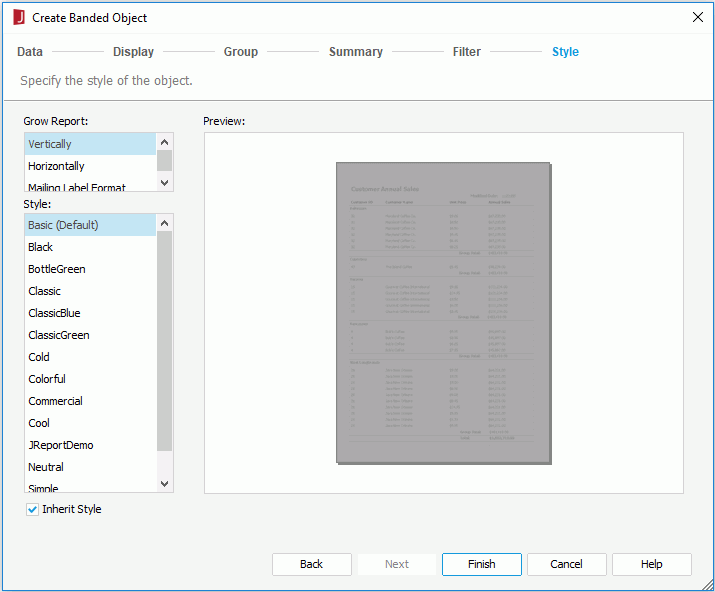
Grow Report
Specifies the layout of the banded object.
Style
Specifies the style of the banded object.
Preview
Displays the selected layout and style effects.
Inherit Style
Specifies whether to make the banded object take the style of its parent. Available only when the banded object is to be inserted into another banded object.
This wizard appears when you click Insert > Banded Object in a page report that is creating using business views. It helps you to insert a banded object into a report, and consists of the following screens:
Back
Goes back to the previous screen.
Next
Goes to the next screen.
Finish
Finishes creating the banded object and closes this wizard.
Cancel
Does not retain changes and closes this wizard.
Help
Displays the help document about this feature.
Specifies a business view for the banded object.
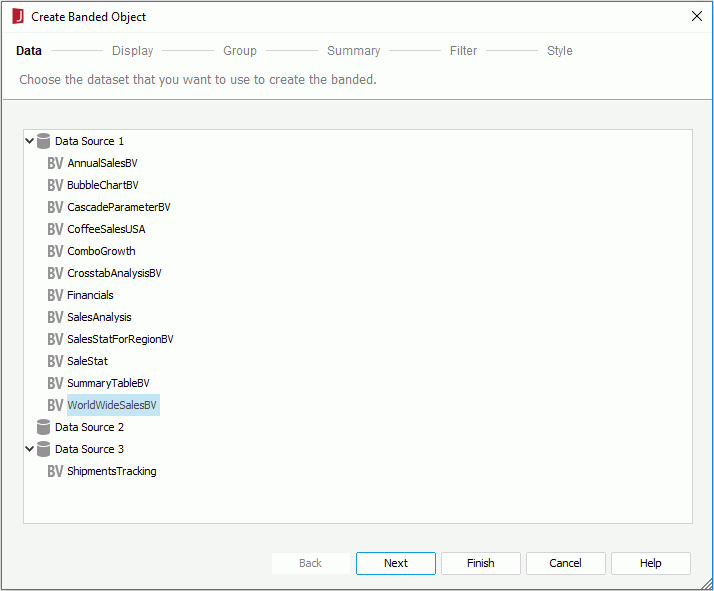
Resources
Lists all the business views in the current catalog. Specify the one you want to use.
Specifies the data fields to display in the banded object.
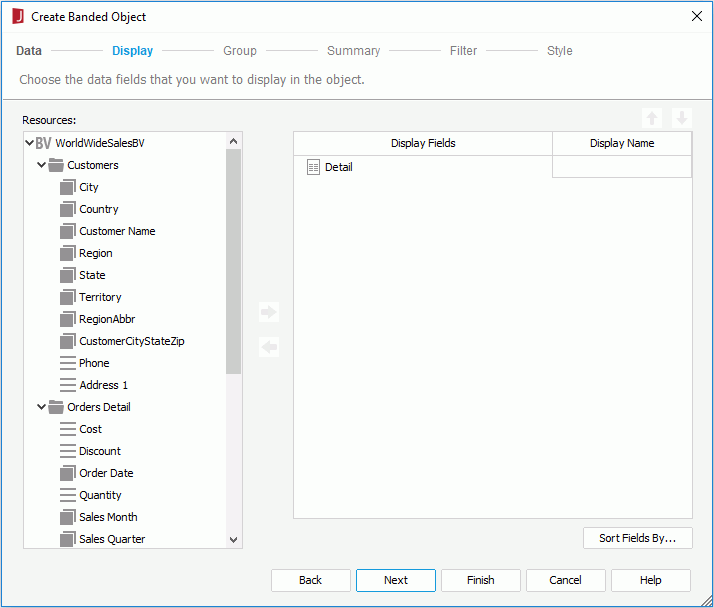
Resources
Lists all the available data resources.

Adds the specified field to use in the banded object.

Removes the specified field that is not required in the banded object.

Replaces the selected field in the banded object with the specified field in the Resources box.

Moves the specified field one step up.

Moves the specified field one step down.
Display Fields
Lists the fields that you have selected to display in the banded object.
Display Name
Shows the display names of the selected fields. You can click the name cells to edit them if required.
Sort Fields By
Opens the Sort Fields By dialog to specify how to sort data in the banded object.
Specifies the fields to group the data.
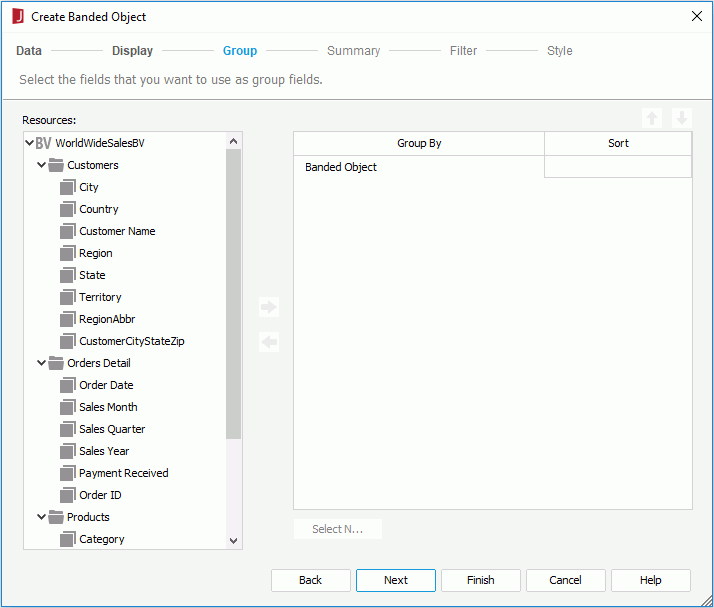
Resources
Lists all the available data resources.

Adds the selected field as the group-by field in the banded object.

Removes the selected group-by field that is not required.

Replaces the selected group-by field in the banded object with the specified field in the Resources box.

Moves the specified group one step up.

Moves the specified group one step down.
Group By
Lists the fields that are used to group data in the banded object.
Sort
Specifies how groups at the specific group level will be sorted.
Select N
Opens the Select N dialog to specify the Select N condition.
Specifies the aggregations to display in the banded object.
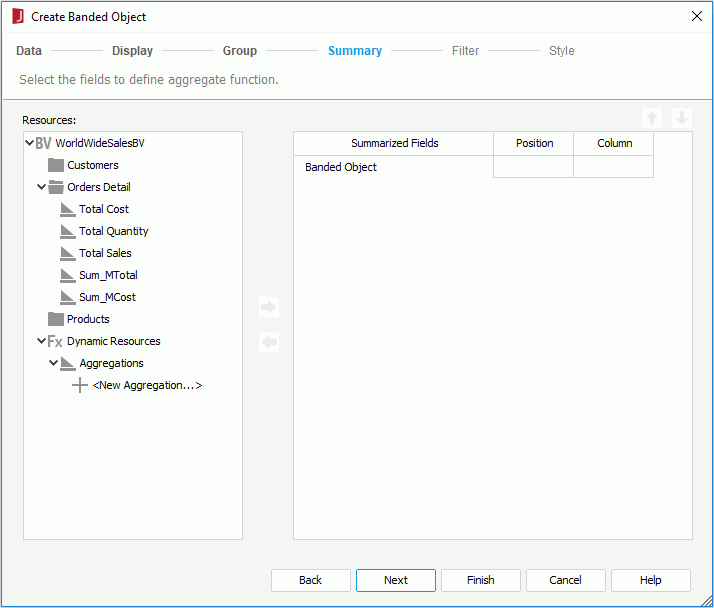
Resources
Lists all the available aggregations.

Adds the selected aggregation to the banded object.

Removes the selected aggregation that is not required.

Moves the specified aggregation one step up.

Moves the specified aggregation one step down.
Summarized Fields
Lists all the aggregations that you want to display in the banded object. If an aggregation is added under the Banded Object node, it will be displayed in the banded panel. If an aggregation is added under the node of a specific group, it will be displayed in the corresponding group panel.
Position
Works together with the Column option to specify the location where the aggregation will be put.
Column
Works together with the Position option to specify the location where the aggregation will be put.
Specifies to filter data displayed in the banded object.
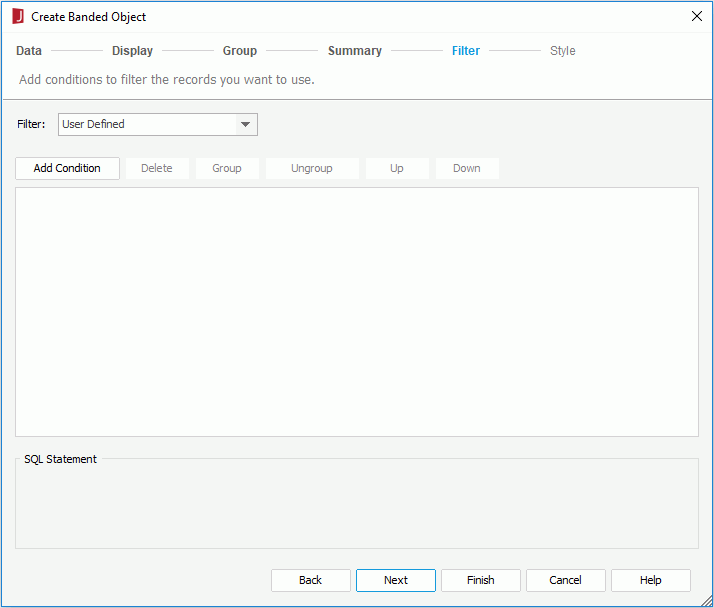
The options in the screen are the same as those in the Edit Filter dialog.
Specifies the style of the banded object.
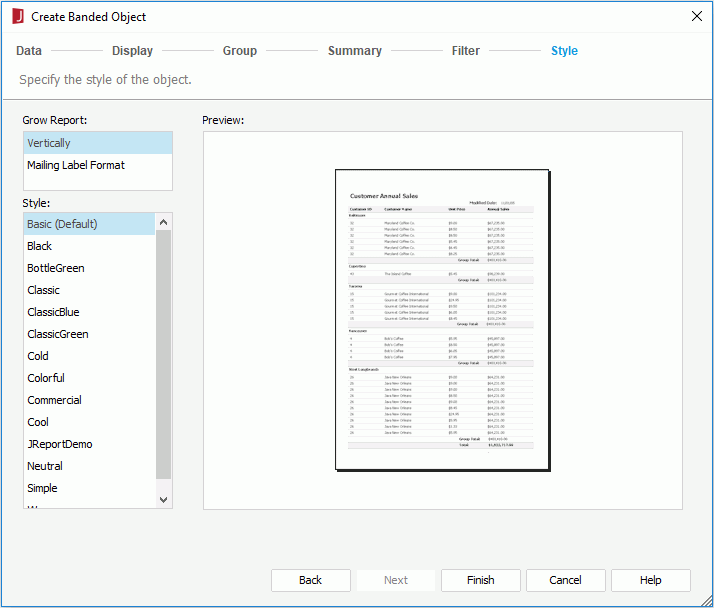
Grow Report
Specifies the layout of the banded object.
Style
Specifies the style of the banded object.
Preview
Displays a diagram illustrating the effect of the selected style on the banded object.
Inherit Style
Specifies whether to make the banded object take the style of its parent. Available only when the banded object is to be inserted into another banded object.